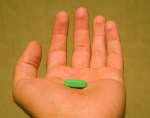Medications Used to Treat Bipolar Disorders
Author: tiger Published Under: Health

Bipolar Disorder is much better understood today than it once was and is characterized by changes in mood that move between being depressed and manic, which refers to a state of almost over confidence. However, there are also mixes in these states and it is common for it to not only affect the thoughts of an individual, but also their actions.
Typically, Bipolar Disorder is treated with some sort of mood stabilizing medication, with treatment being extremely important, as about half of those with a Bipolar Disorder will attempt suicide at some point during their life.
However, many of these medications have some serious side effects. For example, lithium, can lead to chronic kidney failure, so it is important to speak with your doctor about the options available and their risks.
Mood Stabilizers
Mood stabilizers, or mood-regulators, are one of the more common medications used, which attempt to address the widely changing emotions a person with bipolar disorder will experience. In the sixties, the level and types of mood stabilizers could be quite heavy, often acting more to knock out the individual, turning them into a "zombie", rather than to addressing the core problems. Today, this is less true, but is still a legitimate concern.
Lithium remains one of the more common mood stabilizers, in addition to Keppra, Zonegran, and Tegretol.
Anti-psychotic Medications
Antipsychotic Medications are prescribed to address a number of different issues, including things like schizophrenia, but are also quite effective at treating bipolar disorders. Some examples of Antipsychotics include Trilafron, Orap, Haldol, and Zyprexa. However, they also can act as sedatives, making the individual very tired, but often in those who are bipolar, they will have the opposite effect.
Antidepressants
Antidepressants are used to treat depression, which is a common symptom of bipolar disorders. Some examples of antidepressants are Zoloft, Prozac, Elavil, and Tofranil. These types of medications can help reduce anxiety, as well help with depression, but often in those with bipolar disorders, antidepressants can actually make the condition worse. For example, sometimes taking the antidepressants may lead the person to enter into a manic or hypomanic state.
Anti-anxiety Medications
Since anxiety is a common symptom of bipolar disorders, anti-anxiety medication will often help with these types of symptoms. Since antidepressants can often make things worse for those who are bipolar, anti-anxiety drugs are a common alternative. Some examples of anti-anxiety medications are Valium, Xanax, and Klonipin. However, these medications tend to be more addictive than antidepressants, as well as impairing the cognitive functions of the patients.
Taking No Medication
Often, as a result of the side effects of many of the medications used to treat bipolar disorders, it is common for the patient to be resistant to taking medications and so, "going off meds" is common. It is also common for the individual to feel like they can control the disease on their own, but it is important to speak with a doctor when going this route. Also, studies have found that with each progressive episode, the next one will often become worse, so this should be taken into account.